Book contents
- Frontmatter
- Contents
- List of Figures
- List of Tables
- List of Contributors
- Foreword
- Preface
- Introduction
- Part I International Criminology
- Part II Law, Punishment, and Crime Control Philosophies of the World
- Part III Transnational Crime
- Part IV Organized Crime and Terrorism
- Part V International crime
- Part VI Delivering International Justice
- Part VII International Cooperation and Criminal Justice
- Part VIII International Research and Crime Statistics
- Part IX International research resources
- World Map
- Index
Part VII - International Cooperation and Criminal Justice
Published online by Cambridge University Press: 05 October 2014
- Frontmatter
- Contents
- List of Figures
- List of Tables
- List of Contributors
- Foreword
- Preface
- Introduction
- Part I International Criminology
- Part II Law, Punishment, and Crime Control Philosophies of the World
- Part III Transnational Crime
- Part IV Organized Crime and Terrorism
- Part V International crime
- Part VI Delivering International Justice
- Part VII International Cooperation and Criminal Justice
- Part VIII International Research and Crime Statistics
- Part IX International research resources
- World Map
- Index
Summary
The growth in transnational crimes has resulted in an increasing need for international cooperation among police agencies and for new multilateral agreements regarding the arrest and prosecution of offenders. For many years, Interpol has embodied this cooperation, but many more such international organizations have been established in recent times. This is notably the case in the European Union. In 1999, the EU Council of Ministers established the European Police Office, or Europol, a fully-fledged, multipurpose policing agency. It performs an intelligence and information-clearing function supported by high-level information systems, linked to each member states’ security and police institutions (see Chapter 56 by Connor Brady). Subsequently, the EU established Eurojust and the European Judicial Network, which are designed to assist day-to-day cooperation between member states and to simplify extradition processes. As Matti Joutsen explains (Chapter 57), this has substantially improved the speed and efficiency of dealing with cases that span national borders in the EU.
Other notable efforts to improve the policing of transnational cases include the establishment of ASEANAPOL and international protocols established by the World Customs Organization and the G7’s Experts on Transnational Crime. However, as Rob Mawby reminds us (Chapter 54), the difficulties of coordinating the actions of different law enforcement entities in different countries should not be underestimated. Even data sharing among different police forces is greatly complicated by language difficulties and differences in computer technologies and recording systems. Additionally, each law enforcement agency has its own model of operations and its own organizational structures, which again might impede collaboration with other agencies. William McDonald in Chapter 58 echoes the theme that we should not expect too much, too quickly in improved consultation and cooperation. In addition to obstacles identified by Mawby, McDonald cites the lack of extradition agreements among certain states; differences in the legal definitions of crimes; asymmetry in the professionalism of the law enforcement agencies; corruption; and international and domestic politics.
- Type
- Chapter
- Information
- International Crime and Justice , pp. 407 - 408Publisher: Cambridge University PressPrint publication year: 2010



